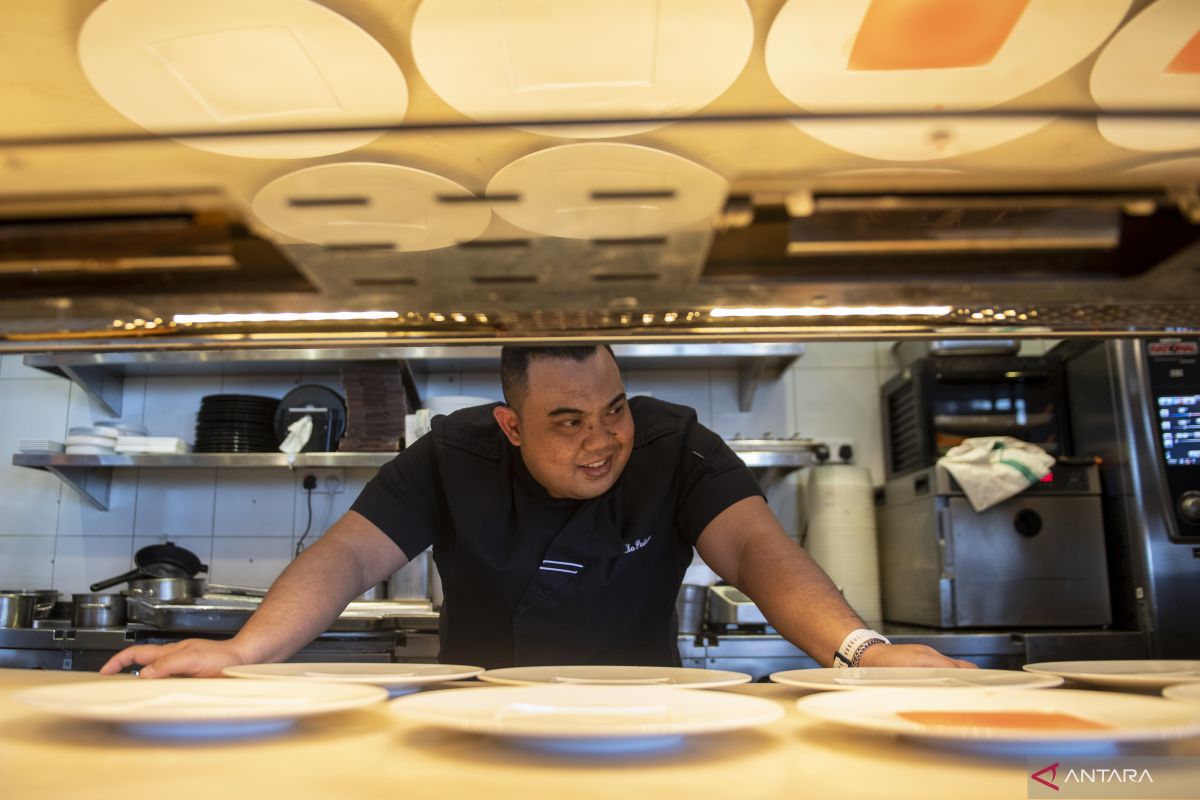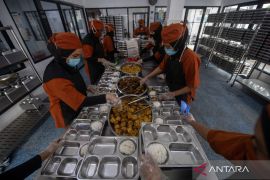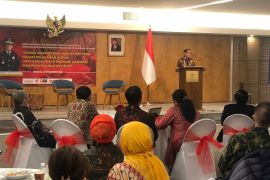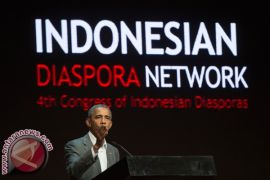At the prime age of 35, the January 1987-born Indonesian has taken on the mantle of executive chef to become the first Indonesian, or even Asian, to hold such a position at the upscale fine dining restaurant.
Pratama first arrived in Dubai at the age of 19, three months after graduating from the institute in August 2008 along with four thousand other people.
"There was fear that came over me just before I left. Everyone spoke English and I did not. The only thing I had in mind was to find a job in Bali," he said in an exclusive interview with a team from ANTARA at At.mosphere Burj Khalifa, Dubai.
However, when he flew to the entertainment capital of the Gulf country, he was unsure of what to feel. He was nervous about his limited linguistic abilities, and at the same time, determined to begin building a better future.
With some funds he had borrowed to kick-start his life in Dubai, he arrived in the city that was growing, with new buildings rapidly joining the skyline, and he discovered that Indonesian workers were dominating the scene. At the Atlantis Hotel where he first worked, around three thousand Indonesians were employed in different areas.
A short year after he began working, crisis hit in 2009, prompting the hotel to lay off thousands of Indonesians. Luckily, Pratama was one of those who got to keep their jobs.
But luck alone was not the determining factor that took him to where he is now. There were ceilings that he had to break along his journey. The first was his English-speaking ability that was considerably limited. During his first 1.5 years in Dubai, he gave his all to improve his language skills, even requesting his Irish colleague to give him lessons on a daily basis.
"I followed him around, taking orders in the kitchen while absorbing his English. After 1.5 years, I was more confident. Since then, opportunities began coming my way. I met kind people who offered them to me," he reminisced.
Such opportunities came with demanding responsibilities for the then young, budding chef. The first five years were the hardest: he was in the kitchen for almost 24 hours at a time and only got about three hours of downtime.
Further, tensions can rise quickly in the kitchen, especially when pressure builds up. "Working in the kitchen is nothing easy," he said and pointed to a scar that has been permanently etched on his forehead due to a kitchen incident.
His time in the kitchen was put to the test in the competitions that he participated in. Not only did they help bring exposure to his name, but also shaped him into the chef that he is. In the first three years, when he joined competitions, he went home empty-handed. Though there were no trophies or titles, he did not leave the competitions with nothing. He learned where he could better himself in the field.
"Competitions are important for chefs. There were 30 to 40 countries that were participating. We saw different things, different patterns, different techniques, different ways other teams organized themselves. I have to say that Singapore had the best organizational skills; they brought portable items. If we never joined these competitions, we’d never know. Somehow it helps. It’s very helpful," Pratama said.
Learning time management and sharpening his competitiveness were some of the skills he acquired from participating in championships, and after a few years of competing, he was awarded with more than a sharpened talent: he bagged four gold, one silver, and one bronze medal at the UAE Culinary Competition in 2012; a gold medal at the Dubai World Hospitality Cup in 2012; a bronze medal for Culinary Artistry at the Luxembourg Culinary World Cup in 2014; and a bronze medal in Culinary Artistry at the Culinary Olympic Germany, where he represented the UAE.
"My career began soaring after joining competitions. After achieving awards, I was no longer looking for jobs, but rather, offers were coming in," he explained.
Breaking barriers
It can take 20 to 30 years for budding chefs to make their way to the executive chef position. Coming from Asia to a scene dominated by European head chefs also posed another challenge for Pratama.
Nevertheless, his perseverance was not shaken. If anything, he grew more determined to not only reach the head chef position, but pave the way for other Asians and Indonesians to attain such a position.
"I grew based on racism. After acquiring a decent English skill, I became more talkative. I asked the young head chefs how could they have been promoted at the young age of 23? And most of them came back to me with the same answer, ‘If you don’t have the same passport as mine, forget it,’" he reminisced.
"I think that was the right words to describe the scene and it stuck with me. At some point, it was right, and at some point, it hurts."
He eventually landed his first job interview for a head chef position at a small fine dining restaurant called Bateaux Dubai. Though his name had begun dominating the scene, he had to go through a series of long tests, and one that was longer compared to his European colleagues.
"They had a lot of doubts. This was the first time they considered an Indonesian Head Chef. I went through a week-long food test period where I was asked to whip up 24 dishes," he said, adding that his European colleagues would probably only be asked to create 3–4 dishes for the same food testing phase.
A sense of pride erupted within him when he was told that he had made it through and had been named Bateaux Dubai’s Head Chef, but little to his surprise, the challenge did not stop there.
"There were still people who were doubtful. Especially, when it comes to management skills, the ability to close a deal, dealing with partners and suppliers, and the ability to provide financial means," he explained.
"I was young then, there was very little confidence that people put in me."
Stepping Back
After 1.5 years of managing the tides as Head Chef at Bateaux Dubai, Pratama was offered a job at one of the most renowned restaurants in Dubai—and the world today—the luxurious At.mosphere, located on the 122nd floor of Burj Khalifa.
He took the position without a shadow of a doubt, but this time, he no longer held the Head Chef title. Pratama was quick to realize that an opportunity to continue learning and growing as a chef was one he could not afford to miss, even though it meant that he had to step back and take up the role of an assistant to the restaurant’s Head Chef.
"Even though I had to drop down one position, I learned that I should not be afraid to step back," he said while relating his journey to becoming a Head Chef at At.mosphere.
In 2018, the establishment’s management offered him the Head Chef position after his predecessor left. Pratama was doubtful. There was so much at stake given At.mosphere’s global reputation, but this time, he took a chance on himself, and so did the management team.
Today, he is heading a team of 29 people from a number of countries, including seven from his own homeland. Prior to the pandemic, the team was bigger, with 48 people under his charge, during which time, he led the restaurant to win several awards and accolades.
They include the TimeOut Commended Afternoon Tea, Good Food Awards Best Dining Experiences (2017), Restaurant TimeOut Best Afternoon Tea Fact Dining Awards Best European Restaurant (2018), Restaurant World Culinary Awards 2020 Best Landmark Restaurants (2020), TimeOut Recommended Restaurants (2021), and TimeOut Most Commended Restaurant (2022).
Today, as he reflects back on his journey, Pratama is striving not only to lead his team with wisdom, but also to curb any racism or discrimination that may arise. To him, what makes a chef is not where he comes from, but his abilities and capacity.
Related news: Optimistic of 4,000 Indonesian restaurants opening abroad by 2024: Uno
Related news: Tourism Ministry to help C Java develop culinary sector
Related news: Most visitors at 2020 Dubai Expo preferred Indonesia's nasi padang
Editor: Sri Haryati
Copyright © ANTARA 2022












